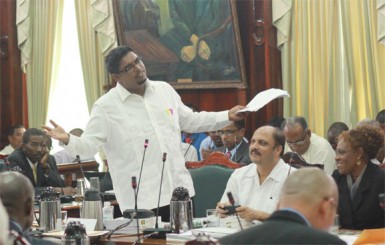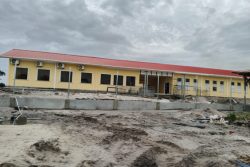Minister of Housing and Water Irfaan Ali yesterday defended the retention of the Value-Added Tax (VAT) at 16% in the government’s proposed budget, while challenging the opposition’s contention that it is not focused on poor and vulnerable groups.
“The argument that VAT brings a burden to the poor and the consumers, without acknowledging the fact that the 16% replaces a 30% Consumption Tax, is a sleight of hand,” Ali told the National Assembly, after APNU Shadow Finance Minister Carl Greenidge concluded his presentation.
He said that the budget seeks to realise the dreams of Guyanese and set the framework through which Guyana would move forward and its people could advance. “Budget 2013 is the embodiment of hope, the spirit of optimism, the definition of Guyana’s dream,” he said. “The future is ours… it is Guyana time! Waka Waka!”
According to Ali, over the last seven years Guyana grew at an average of 4.53%. “This is not what the Minister of Finance said… this is what was reported in the ECLAC 2012 Economic Survey of Latin America and the Caribbean,” he said. He added that GDP per capita increased from US$1,694 in 2006 to US$3,138 in 2012. “Isn’t this progress? Isn’t this advancement in our economy?” he asked.

He said that this increase in GDP per capita has not had an inflationary effect because of the measures the PPP/C government put into place. He said that it is the subsidies that the government put in place that ensured that inflation rate remained stable. “It was these measures that ensured that inflation decreased to 3.5 %,” he added.
Ali also said that the growth in foreign direct investment between 2006 and 2012 trended upwards to $1.326 billion. “…This is a direct result of the confidence [investors] have in Guyana,” he said. Turning to domestic investments, he said that there has been growth in loans and advances to the business sector, from $30.6 billion in 2006 to $82.6 billion in 2012. “Not only were we able to stimulate foreign direct investment. We were able to build our confidence in our Guyanese investors to the extent that they have expanded their investment portfolio,” he said.
He also said that the local financial sector is as strong as it has ever been and this is due to the policies of the government. “It is not surprising that our banking system is ranked 30 out of 142 countries in terms of soundness… Who ranked us? Not the Minister of Finance but the World Economic Forum 2011,” he said. He added that these positive conditions are responsible for lower cost for credit and not only access to financing. He said that the average lending rate in December 2006 was 13.12 % and today it is 10.12 %. “Not only is access to capital abundant, but more importantly the cost of capital has also reduced,” he said.
Government, Ali assured, will be taking measures to improve its poor ranking on the ease of doing business assessment, which marks down Guyana every year. “Within five years, once we accomplish the implementation of these 60 measures, we are going move our ranking from its present position to being it in line with the Caribbean and Latin America,” he said.
He added that the areas to be given focus during the implementation of the measures will be starting a business, dealing with construction permits and licences, getting electricity, registering property, getting credit, protecting investment, paying taxes, trading across borders, and enforcing contracts and resolving insolvency.
He said that the Marriott Hotel will yield a positive net present value of estimated $6.5 million over a ten-year holding period. This is equivalent to a rate of return of 11 %. The total value added impact of the project is estimated to be approximately $17.4 billion during the construction phase alone. He said that based on the economic feasibility study, if one looks at the airport expansion project, this is estimated to yield an internal rate of return of 11 %.
With regards to the persistent problems of airlift in Guyana, Ali said that the government has put together a public-private group that would go to Atlanta, Georgia in the United States of America, where most of the airline head offices are, to negotiate and find a solution.







